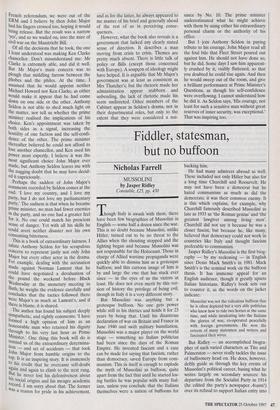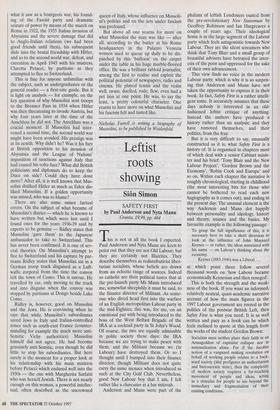Fiddler, statesman, but no buffoon
Nicholas Farrell
MUSSOLINI by Jasper Ridley Constable, £25, pp. 430 hough Italy is awash with them, there have been few biographies of Mussolini in English — some half a dozen since the war. This is no doubt because Mussolini, unlike Hitler, turned out to be no threat to the Allies when the shouting stopped and the fighting began and because Mussolini was not responsible for the Holocaust. Those in charge of Allied wartime propaganda were quickly able to dismiss him as a grotesque buffoon, and this cartoon image of him is by and large the one that has stuck ever since — in the eyes of us the victors at least. He does not even merit by this ver- sion of history the privilege of being evil, though in Italy it is a very different story.
But Mussolini was anything but a grotesque buffoon. No one gets power while still in his thirties and holds it for 23 years by being that. Until his disastrous declaration of war on Britain and France in June 1940 and swift military humiliation, Mussolini was a major player on the world stage — something no Italian politician had been since the days of the Roman Empire. He invented fascism and a case can be made for saying that fascism, rather than democracy, saved Europe from com- munism. This in itself is enough to explode the myth of Mussolini as buffoon, quite apart from the fact that until he started los- ing battles he was popular with many Ital- ians, unless you conclude that the Italians themselves were a nation of buffoons for backing him.
He had many admirers abroad as well. These included not only Hitler but also for a long time Churchill and Roosevelt. He may not have been a democrat but he hated communism as much as did the democrats; it was their common enemy. It is this which explains, for example, why Churchill famously described Mussolini as late as 1933 as 'the Roman genius' and 'the greatest lawgiver among living men'. Churchill did not say it because he was a closet fascist, but because he, like many, believed that democracy could not work in countries like Italy and thought fascism preferable to communism.
Jasper Ridley's Mussolini is the first biog- raphy — by my reckoning — in English since Denis Mack Smith's in 1981. Mack Smith's is the seminal work on the buffoon thesis. It has immense appeal for an English audience, though it greatly upsets Italian historians. Ridley's book sets out to counter it, as the words on the jacket indicate: Mussolini was not the ridiculous buffoon that he is often depicted but a very able politician who knew how to ride two horses at the same time, and while inculcating into the Italians the glories of war, co-operated peacefully with foreign governments. He won the esteem of many statesmen and writers and fascinated their wives.
But Ridley — an accomplished biogra- pher of such varied characters as Tito and Palmerston — never really tackles the issue of buffoonery head on. He does, however, deftly guide us through the key events of Mussolini's political career, basing what he writes largely on secondary sources: his departure from the Socialist Party in 1914 (he edited the party's newspaper Avanti!) over its refusal to support Italian entry into what it saw as a bourgeois war, his found- ing of the Fascist party and dramatic seizure of power by means of the march on Rome in 1922, the 1935 Italian invasion of Abyssinia and the severe damage that did to Anglo-Italian relations (we had been good friends until then), his subsequent slide into the brutal friendship with Hitler, and so to the second world war, defeat, and execution in April 1945 with his mistress, Claretta Petacci, by partisans as they attempted to flee to Switzerland.
This is fine for anyone unfamiliar with the subject, such as undergraduates or the general reader — a first-rate guide. But it is light on analysis — for example, on the key question of why Mussolini sent troops to the Brenner Pass in 1934 when Hitler was then threatening to invade Austria, but why four years later at the time of the Anschluss he did not. The Anschluss was a crucial moment. If Mussolini had inter- vened a second time, the second world war might have been avoided. His prestige was at its zenith. Why didn't he? Was it his fury at British opposition to his invasion of Abyssinia and the League of Nations' imposition of sanctions against Italy that had caused his volte-face? What did British politicians and diplomats do to keep the Duce on side? Could they have done more? After all, it is well known that Mus- solini disliked Hitler as much as Eden dis- liked Mussolini. If a golden opportunity was missed, who was to blame?
There are also some minor factual errors. On the subject of what became of Mussolini's diaries — which he is known to have written but which were lost until I found ones for the years 1936-39 said by experts to be genuine — Ridley states that Mussolini 'gave them' to the Japanese ambassador to take to Switzerland. This has never been confirmed. It is one of sev- eral theories. On Mussolini's attempt to flee to Switzerland and his capture by par- tisans Ridley states that Mussolini sat in a German troop truck disguised as a Luft- waffe corporal from the time the convoy left the town of Como. This is untrue. He travelled by car, only moving to the truck and into disguise when the convoy was stopped by partisans at Dongo beside Lake Como.
Ridley is, however, good on Mussolini and the Jews. He is convincing when he says that while Mussolini's subordinates saved Jews in Italy and Italian-controlled zones such as south-east France (counter- manding for example the much more anti- Semitic Vichy authorities) Mussolini himself did not agree. He had become genuinely anti-Semitic, even though he did little to stop his subordinates. But here surely is the moment for a proper look at his relationship with his main mistress before Petacci which endured well into the 1930s — the one with Margherita Sarfatti who was herself Jewish. There is not nearly enough on this woman, a powerful intellec- tual, often described as the uncrowned queen of Italy, whose influence on Mussoli- ni's politics and on the arts under fascism was profound.
But above all one yearns for more on what Mussolini the man was like — after all, according to the butler at his Rome headquarters in the Palazzo Venezia women used to queue up daily to be dis- patched by this 'buffoon' on the carpet under the table in his huge marble-floored office. He was a brilliant tabloid journalist, among the first to realise and exploit the political potential of newspapers, radio and cinema. He played tennis and the violin well, swam, duelled, rode, flew, even had a pet lion at one point. He was, to say the least, a pretty colourful character. One yearns to have more on what Mussolini and his fascism felt and tasted like.
Nicholas Farrell is writing a biography of Mussolini, to be published by Weidenfeld.



















































































 Previous page
Previous page